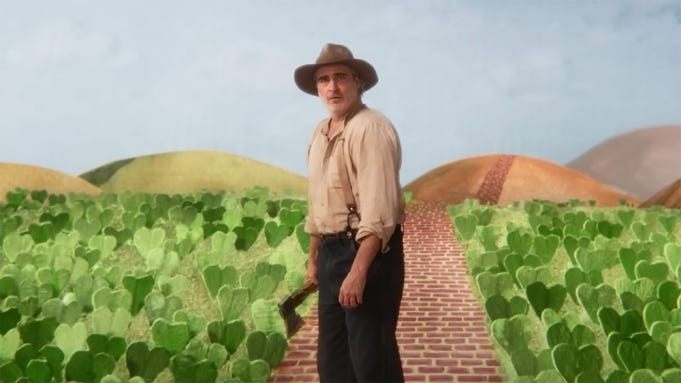Beau Is Afraid
One of the strangest cinematic experiences you'll ever have, but also an extremely compelling and wryly comical one.
“Beau Is Afraid” is certainly one of the strangest cinematic experiences I’ve ever had. Right after a press screening, people ask critics whether they liked a film. In this case, the truest answer I can give is this is a movie that defies conventional expectations. It’s not really made to be “liked.”
I’ll say this: I was absolutely compelled by it. Despite its 3-hour running time, I didn’t feel like it dragged, though I had some problems with the last 25 minutes or so. But those were more about creative decisions by writer/director Ari Aster (“Hereditary,” “Midsommar”) than just being too long.
Joaquin Phoenix plays Beau Wasserman, an incredibly anxious and vulnerable man in his mid-40s living in a big city. Though he looks much older: Phoenix is barely recognizable, certainly extravagantly different than his emaciated provacateur in “The Joker” — bloated, mush-mouthed, shambling, with just a few wisps of gray hair atop his head.
Beau does not seem to work or do very much, other than seeing a therapist (Stephen McKinley Henderson) regularly. As the story opens, he is about to fly home to see his domineering mother, Mona (played by Zoe Lister-Jones in flashbacks to childhood), in their hometown of Wasserton.
An incident occurs that prevents him from leaving — really, a string of incidents — and Beau’s mom subsequently dies. He spends the rest of the movie on a strange, semi-comic odyssey to get back home and pay his respects, a series of misadventures that take him through a landscape both surreal and absurdist.
If you could somehow mash the themes and aesthetic of early Woody Allen and Luis Buñuel, with a healthy dash of “Alice in Wonderland,” you might get something like “Beau Is Afraid.”
The humor is very dark and wry, and there’s lots of horrifying bloodshed and some explicit nudity and sex. I found myself alternately repulsed, hysterical with laughter, scratching my head and scared out of my mind. It’s a film you have to cease trying to understand and just sit back and experience.
Let’s put it this way: this is a movie during which you’ll encounter both Birthday Boy Stab Man, a deranged nude killer who’s treated as a local attraction, and a giant sentient phallus who resembles Jabba the Hutt’s X-rated cousin.
The different sections of Beau’s journey are seemingly unrelated, other than he’s the one it’s happening to. There are a lot of reversals and setbacks, and in some way each new part tends to puncture or undermine the previous one.
I will say this — each portion is fully invested in itself, and while you’re watching you are completely caught up in it. The most memorable is a long sequence where Beau has become lost in the woods and stumbles upon a troupe of actors, and sits down to watch their play. It’s about a man who becomes separated from his family, and Beau realizes it’s his story, and things shift to a partly animated sequence where he grows into an old man.
It’s practically its own movie, so rich and emotional is this fragment of Beau’s journey.
Contrast this with the opening sequence, in which Beau lives in absolute hellscape of urban decay. Bodies lie strewn in the street, and murders occur in front of people’s eyes without much notice. Beau is a practical prisoner in his dilapidated apartment building, venturing out for his therapy appointments to dodge the wanton display of sex, drugs and human detritus.
Are things actually like this? Or is this just how Beau perceives it in his twisted mindscape of fear and delusion?
After being seriously injured in an accident-slash-attack, Beau wakes up in the care of Grace and Roger (Amy Ryan and Nathan Lane), a WASP-y, well-to-do married couple nursing him back to health. Roger’s a surgeon who treated him at the hospital, but they regard Beau as their personal responsibility and he somehow wound up at their home. They even begin to treat him as part of the family, possibly a replacement for their son, killed in the Army. This is much to the consternation of their teen daughter, Toni (Kylie Rogers), who grows increasingly antagonistic toward Beau.
There are repeated flashbacks to Beau’s troubled childhood, in particular a cruise he took with his mother where he met Elaine (Julia Antonelli), a willful girl his own age. Beau is absolutely passive and apologetic in all his interpersonal interactions, so it’s up to her to stoke the nascent fire of romance.
Later on, Elaine will turn up as an adult, now played by Parker Posey. It becomes clear that she’s in many ways just as broken as Beau, though is better at hiding it.
Beau eventually makes it home, just missing the extravagant funeral for his mom, played in her older iteration by Patti LuPone. Without giving anything away, the last bit turns into a very Freudian tragicomedy, with Mona portrayed as a shrieking harridan who blames Beau for not returning her love.
From what we can see, he actually gives more than he got. But mother, who grew a pharmaceutical empire after the utimely death of her husband, expects huge dividends from meager investments.
Tying it all together is the performance of Phoenix as Beau — pathetic, servile, speaking in high, querulous voice as if every utterance contains a plea of forgiveness for having been spoken. Oddly, I did not grow tired of this character as I think I normally might. The audience is directed to laugh over and over again at Beau, but we never lose our sense of empathy for him.
“Beau Is Afraid” is a deeply weird movie. I can’t call it wonderful, but it’s the sort of thing that stays with you and makes you wonder about your own place in the world.






Now, I must see it...